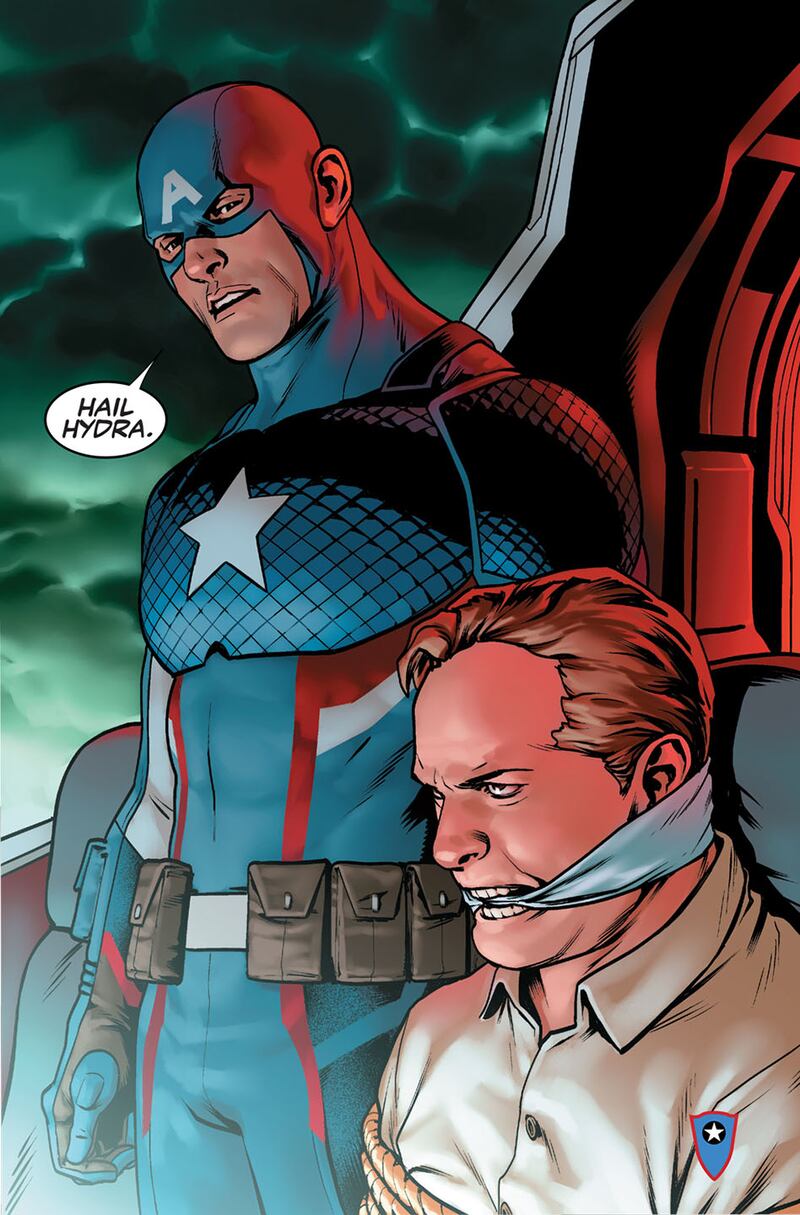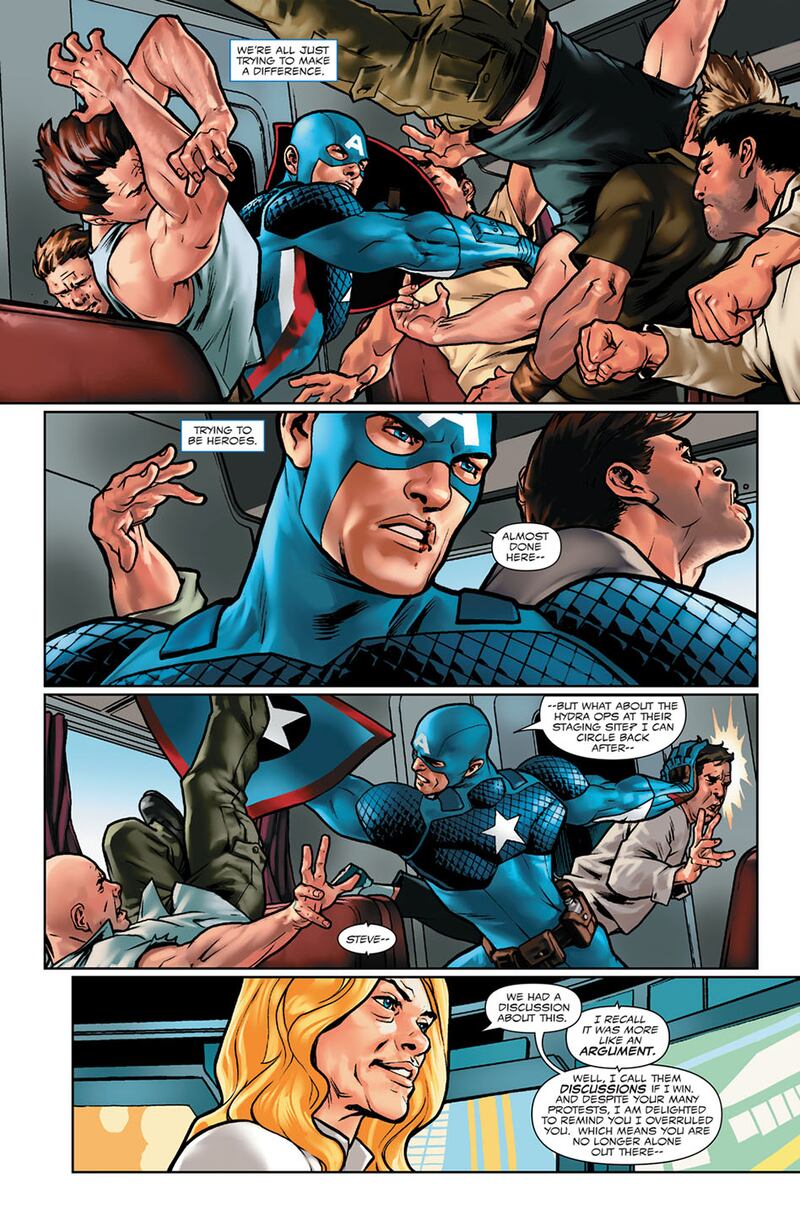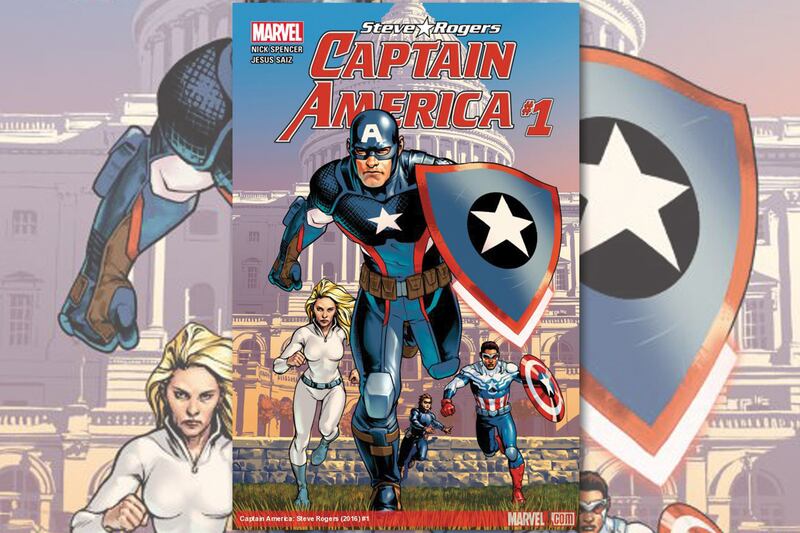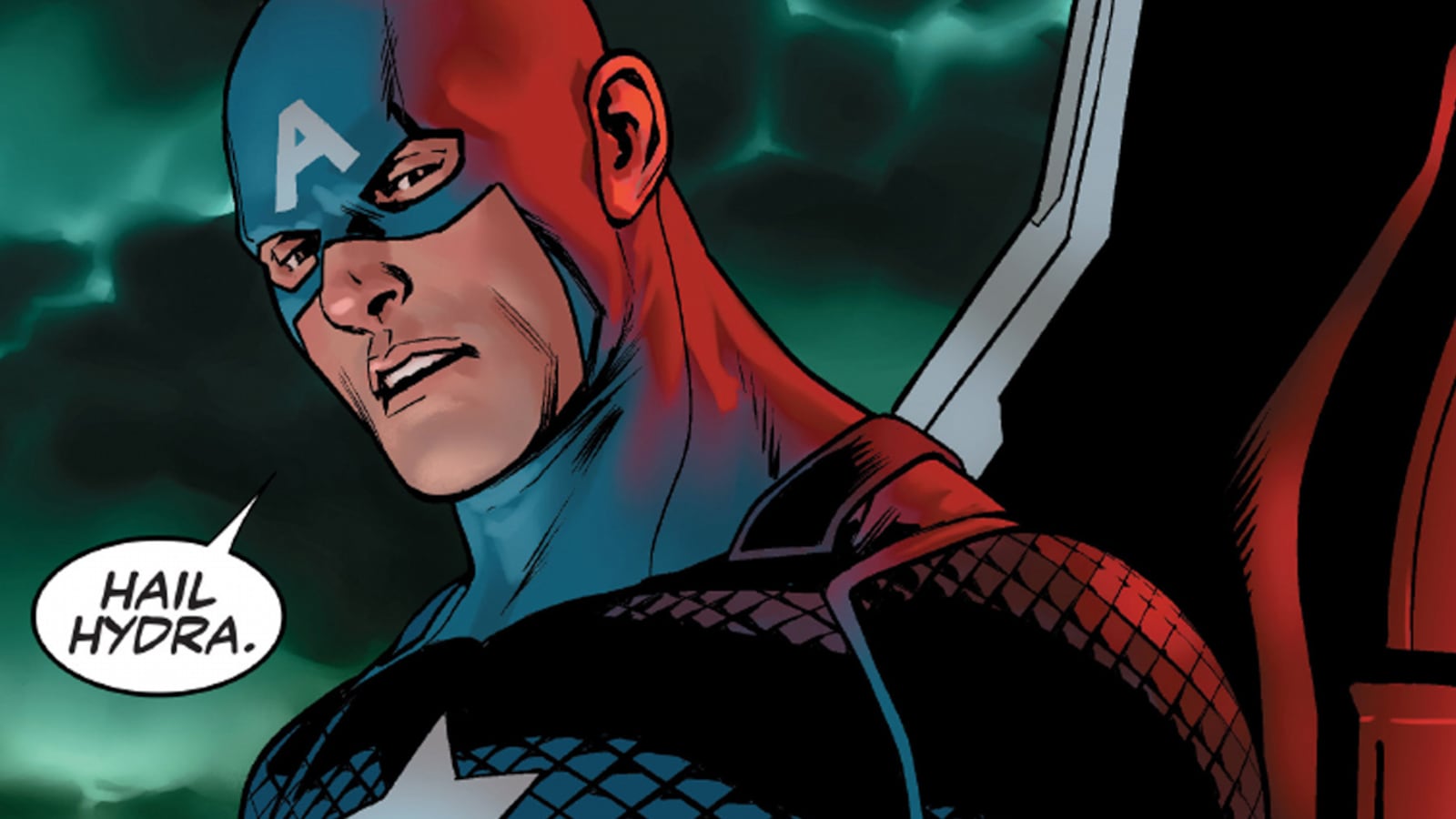“I’m the most hated man in America today,” laughs Nick Spencer on the Wednesday his Captain America: Steve Rogers #1 hits comic store shelves. “And Donald Trump is running for president!”
Just seven months ago, the Ant-Man and Morning Glories writer attracted the ire of Fox and Friends for daring to pit Cap against a group of border-patrolling white supremacists, a move the show’s hosts felt was an open insult “against conservatives.”
Now Spencer’s work is a trending topic again, this time for outraging the opposite side of the aisle. The provocative first issue of his Captain America run outs Steve Rogers as a deep-cover Hydra agent—a jaw-droppingly audacious twist that’s incensed certain comic fans and earned the writer accusations of everything from anti-Semitism to soft homophobia (for giving Steve a dual identity rather than a boyfriend).
While he couldn’t have predicted the magnitude of the response (or the #SayNoToHYDRACap hashtag), Spencer says outrage is exactly what he wanted.
“When you decide to do something like this, you understand obviously that people aren’t gonna throw you a party for it,” he says. “You understand that this is the kind of story designed to upset people and shock people and worry people. That’s the response you’re supposed to have to something like this, when you’re seeing a bad thing.”
Near the end of the issue—the first solo outing for Rogers in Marvel’s “All-New, All-Different” reboot—we learn that Cap’s mother Sarah may have been lured into a nascent form of Hydra back in 1926 by a woman who saved her from her abusive husband.
The revelation takes a grotesque turn when Steve, back in the present day, shoves an unsuspecting sidekick, Jack Flag, off an airplane, apparently to his death. In the issue’s chilling last panel, Steve turns and utters those dreaded words: “Hail Hydra.”

Captain America, that star-spangled symbol of morality, selflessness and freedom, is now one of the Marvel universe’s most insidious villains—and he has been for over 75 years.
Unlike most seemingly world-changing comic book twists, turns, and deaths, says Spencer, this one will not be undone within the span of one story arc, or even in the next few months.
“This is something that is gonna have a profound effect on the Marvel universe,” he says. “I’ve seen a lot of people say things like, ‘Oh, it’ll be wrapped up in the arc,’ or ‘Give it six months.’ And I can tell you, that’s not the case. This has real lasting repercussions that are gonna be with us for a while.”
The Daily Beast talked to Spencer about why he had Steve break bad, how the twist will reconcile with the character’s legacy (and that of its Jewish creators), and his response to fans’ outrage.
First off, are you OK? A lot of vitriol is going your way online. You're a trending topic!
(Laughs.) No, I love this stuff. I feed off it, it’s totally fine. It’s looking like it’s gonna be a no. 1 trending topic here in a second. I’m the most hated man in America today and Donald Trump is running for president!
I was surprised by the sheer magnitude of the response. I can’t remember the last time something that happened in comics upset quite this many people.
When you decide to do something like this, you understand obviously that people aren't gonna throw you a party for it. You understand that this is the kind of story designed to upset people and shock people and worry people. That’s the response you’re supposed to have to something like this, when you’re seeing a bad thing. So, yeah, this is certainly the kind of response I expected, but in terms of the magnitude of it and just how many people are chiming in, that part’s unreal. That surpassed any expectation that I had.
I think it just comes down to [the fact that] this character, particularly since the movies, has really exploded in popularity. Obviously he represents a lot to a lot of people. They’re emotionally invested, which is good. The worst thing that could have happened today is people shrugging, or even being reasonable. That would’ve said that we didn’t stick the landing on it. So this is what we wanted, we just have even more of it than we imagined.
What sorts of discussion with Marvel went into this? I read your editor Tom Brevoort said this twist had been in the works ever since Sam Wilson: Captain America #1.
Yeah, we’ve been holding onto this for about 16 months now, so it’s been well over a year that we’ve been keeping this under wraps. And that was a hugely gratifying thing, especially in the last couple of months as we started work on the issue. There’s an artist drawing it [Jesús Saiz] and a letterer [Joe Caramagna], and you start to worry because obviously the book is getting passed through a lot of hands and there’s something tangible out there that can get leaked. So yeah, I mean all the credit in the world goes to Tom and everyone at Marvel, they really went above and beyond to keep a lid on this. They took a lot of special measures that we’ve never had before—and it worked! We managed to keep this until it started leaking out last night, which was inevitable because that’s when the book started arriving at various places. But yeah, it was a big success. I was really surprised. I thought for sure it would be ruined.
Was there ever resistance from Marvel to the idea?
It’s a really funny thing, there was not an enormous amount of debate about the story. We do our creative retreats and this was a major subject at both of the last two. And honestly, that was a little surreal for me as well. Everybody seemed really into the idea and really supportive. I know that I went into the first [retreat] really expecting to have to fight for it and for there to be pushback, and there was very little. We had a luxury though, I could lay out the whole story for them. What everybody got today is obviously just sort of an opening chapter. I was able to kind of explain the whole thing and put it all into context. I’m as excited about this story as anything I’ve ever done in comics. I think we’re onto something here. And certainly in the room it seemed to go over well and that’s always a really encouraging sign.
Where did this new idea come from and why did a change of this magnitude feel necessary for the series?
It almost happened by chance, really. Rick Remender was the previous writer on the book and when I took over, he had had some plotlines that were outstanding. Tom ran through them with me, and one of them was that Hydra had infiltrated all the various teams and organizations in the Marvel universe and we were gonna be weeding out the various Hydra clans. And, to be honest, at the time, I had just gotten the Captain America assignment and that story really felt like an event. I felt like it was maybe a little too big for me at that point, and that wasn’t something they would want me to do.
So I started to kind of drill it down a bit and I started wondering, what if there’s just one Hydra plant? What if they think they’re looking for a hundred people and it turns out there’s just one really good one? And if there’s just one really good Hydra plant, who would that be? Within a second, I realized that Steve was by far the person who could do the most damage. He’s the leader of the Avengers, he has a relationship with the U.S. government, and he works closely with SHIELD. Not to mention just his status in the Marvel universe—he’s a symbol, everyone trusts him, everybody looks to him as an authority.

One of the first things most people will probably think is, “But hasn’t he spent the last 75 years fighting Hydra?” How do you reconcile the twist with the character’s history?
I can’t say a lot on that front, but what I can say is that that is not a huge point of concern in the story. That question will be answered, at least for the most part, in the next issue. That wasn’t something that we wanted to drag out. We wanted to make that stuff as clear as we could upfront. So now that we’ve gotten the big surprise, we’re going to go back and explain some things to you so that you, as a reader, have a much clearer vantage point. But your vantage point may differ greatly from the characters in the Marvel universe.
There’s a lot of uproar online about how this storyline insults the legacies of Captain America’s Jewish creators, Jack Kirby and Joe Simon.
Look, everybody who’s working on this story loves Captain America. I know that it may not seem like it today. But this book is edited by Tom Brevoort, who has been protecting this character’s legacy for a very long time now. He’s not gonna let me do anything that he thinks is going to endanger that character’s legacy and how the character is perceived. It’s always difficult when you’re at this point in a story, because you don’t just wanna tell people, “Everything’s gonna work out great!” Because that certainly may not be the case here. But what I think I can say with confidence is that with this story, our intention and our hope is that in its own unique way, it reinforces what everybody already knows about Captain America, which is his power as a symbol and what that means. We are approaching it from a different angle, but I think it illuminates the character in a way that we’ve never seen before.
It’s always tough. The eternal divide is the reader wants the character to succeed, to be happy, to win. Our job is often to put the characters through things and that can often be mistaken for a lack of respect or care for the character. It’s just the reality of what draws people into these stories, whether you realize it or not, and this is going to be a major test for a lot of characters in the Marvel universe.
The resurgent Hydra that Red Skull is pulling together seems to share a lot of parallels with Trump's “Make America Great Again” campaign. It’s xenophobia and anti-political correctness. What went into forming his recruitment platform?
What I think I can say about this, is one of the later conceptions of the story was “what if the new Hydra is a blank?” We wanted to kind of get away from the green and yellow costumes and the doomsday machines and things like that and really reconnect with what the organization has at its sort of moral core.
We’ve obviously seen a lot of growth in white supremacist organizations and extreme nationalist groups in the U.S., certainly over the last eight years. And so I had to do the ugly research of what’s drawing folks into those groups. What’s driving recruitment? The Skull speech is a slightly sanitized version of that stuff. It’s been a little interesting hearing people say, “Oh, he’s taking political shots.” We’ve done that kind of thing, where we used a lot of topical language in stories with varying degrees of sincerity. This was a little different. I was looking at something else when I came to this. If people see those things as similar, it’s not my place to say. (Laughs.)

There’s this moment where, through the character of Robbie, we get an on-the-ground account of how radicalization of disenfranchised young people works. What did you mean to highlight by outlining Robbie’s journey from poverty to addiction to Hydra?
Getting back to what I was saying before about what a new Hydra would look like and getting away from the previous trappings, I wanted to make them interesting. I wanted us to kind of understand where this endless supply of bodies that Hydra always has comes from. And why someone would sign up for the gig. It became pretty clear that that wasn’t going to be a supervillain screaming at the top of his lungs about how he was gonna take over the world and everybody was gonna bow to him. Instead, they would need to see some potential self-interest gain from working in Hydra. It’s probably a pretty good paycheck because it’s a dangerous job.
So again, when looking at various hate groups and what drew those people in, these are the kinds of things you see a lot. A lot of times they’re recruiting in areas that are economically depressed, they’re recruiting people who don't have a lot of education or opportunity, who could gain from employment and having future prospects. We [in the U.S.] have a lot of people like that. It’s kind of a miracle that we don't have more of this stuff. So I wanted to bring the camera in close on one of them and give you an idea of who’s filling these rooms of people that SHIELD’s fighting against. I think it makes for a stronger dynamic. It presents SHIELD with some new problems that they’ve never really had to deal with before.
What should we be reading into Eric Selvig’s expression there at the end? Was he in cahoots with Cap?
I know, he looks a little dark, doesn't he? He looks a little creepy. (Laughs.) That’s a good observation. Good thing to keep in your back pocket for future issues.
Have you been watching the #GiveCaptainAmericaABoyfriend campaign unfold?
Yeah. I think the only thing I can say there is it speaks to people’s passion for the character. Which probably isn’t much of an answer, but people strongly identify with these characters, they’re strongly invested in these characters’ lives, and I think that this is a reflection of that energy.
What can we expect from the story going forward?
I would tell everybody to take the solicits and stuff that are out there with a real grain of salt. (Laughs.) We had to embellish somewhat so that nobody would get suspicious. What I think I can say to folks that might help them visualize where the story is going is that this is not so much a story about what has come before as it is about what comes next. The story is not Steve’s past, it’s Steve’s future.
So we’ve established that Captain America is Hydra. That is a huge moment in the Marvel universe, regardless of when it came to be or how it came to be. What that means in terms of the doors that are open to Steve, what he can do, and what he chooses to do with that power is what remains to be seen. But the thing that I can say is it’s a huge story I really can’t believe that they’re letting me do.
This is something that is gonna have a profound effect on the Marvel universe. I’ve seen a lot of people say things like, “Oh, it’ll be wrapped up in the arc,” or “Give it six months.” And I can tell you, that’s not the case. This has real lasting repercussions that are gonna be with us for a while.






